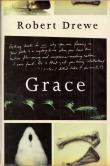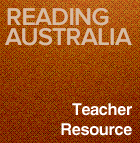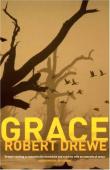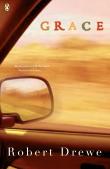AustLit
Latest Issues
AbstractHistoryArchive Description
Some relevant facts about Grace Malloy. Apart from being named after a 100,000-year-old skeleton, she was twenty-nine and for much of the past three years she'd been hiding from an erotomaniac.
Physically and emotionally besieged, Grace attempts to claw back her personal territory by abandoning her inner-city life as a film reviewer and fleeing to the remoteness of the Kimberley – where existence and territory have altogether wider implications.
Lying low, working in a wildlife park, she slowly reclaims her sanity. Her only links to the outside world are her father and her stalker.
Intricately plotted, breathlessly paced, Grace reflects on the countless varieties of love and the nature of fear.
At once intimate and grand in scale, this disquieting and provocatively witty novel reveals the full vigour of an artistic vision in turn poetic and cinematic.
Source: Penguin Random House Australia
(https://penguin.com.au/books/grace-9780143005322)
Reading Australia
This work has Reading Australia teaching resources.
Unit Suitable For
AC: Year 11 (English Unit 2)
Themes
borders, gender, identity, mental illness, the impact of the past upon the present
General Capabilities
Critical and creative thinking, Ethical understanding, Information and communication technology, Intercultural understanding, Literacy, Personal and social
Notes
-
Dedication: For Sam and Anna.
-
Epigraph: In late September the dunes stop moving, as if a seasonal migration had ground to a contoured, abrasive end. Anthony Lawrence.
Publication Details of Only Known VersionEarliest 2 Known Versions of
Works about this Work
-
[Essay] : Grace
2013
single work
essay
— Appears in: Reading Australia 2013-;'The ‘social realist novel’ that Robert Drewe quite deliberately set out to write with Grace could have sunk under the weight of its own ideas, were it not for the thriller foil the story is wrapped in. Grace Molloy, the protagonist, is on the run from a crazed erotomanic stalker, whom she refers to as ‘the Icelander’. Grace is the daughter of an anthropologist, and named after the famous discovery that her father John Molloy made of ‘the first modern woman’, a skeleton he named ‘Grace’ for its ‘gracile’ form. This isn’t just a thriller; Drewe is musing over the birth of humanity itself, and the movement of people across the earth. He poses complex questions that don’t arrive at answers, but in a culture that often hides behind euphemisms – that refugees are ‘boat people’, for example – and is still struggling to come to terms with ideas of belonging, just to pose the questions has power.' (Introduction)
-
'Grace of the Crocodiles' : Towards Deterritorialization
2012
single work
criticism
— Appears in: Engaging with Literature of Commitment : The Worldly Scholar (Volume 2) 2012; (p. 231-244)'In an article entitled 'Minimal Selves,' Stuart Hall suggests that 'identity' is formed at the unstable point where the 'unspeakable' stories of subjectivity meet the narratives of history, of a culture.' This essay is an attempt to explore just such an articulation of identity, as it crystallizes at the boundary between the private and the public in one of Robert Drewe's most recent novels, Grace (2005)...' (From author's introduction 231)
-
Shock Crocs
2010
single work
autobiography
— Appears in: The West Australian , 16 October 2010; (p. 30) -
Crocodile Man
2010
single work
column
— Appears in: The Age , 9 October 2010; (p. 5) Robert Drewe recalls a behind-the-scenes tour of Malcolm Douglas's crocodile park in Broome. The tour was part of Drewe's research for his novel Grace. -
Close Encounters
2010
single work
short story
— Appears in: The West Australian , 27 February 2010; (p. 22)
-
A Love Affair with the Kimberley
2005
single work
review
— Appears in: The Canberra Times , 30 July 2005; (p. 12)
— Review of Grace 2005 single work novel -
Graced with Grandeur
2005
single work
review
— Appears in: The Weekend Australian , 30-31 July 2005; (p. 8-9)
— Review of Grace 2005 single work novel -
Grace Notes and Empathetic Characters
2005
single work
review
— Appears in: Australian Book Review , August no. 273 2005; (p. 13)
— Review of Grace 2005 single work novel -
Crucial Connections
2005
single work
review
— Appears in: The Age , 6 August 2005; (p. 5)
— Review of Grace 2005 single work novel -
Woven with Skill
2005
single work
review
— Appears in: The Advertiser , 6 August 2005; (p. 10)
— Review of Grace 2005 single work novel -
Northern Territory
2005
single work
column
— Appears in: The Advertiser , 20 August 2005; (p. 11) -
The Lesson of 'The Yellow Sand' : Robert Drewe's Dissection of 'The Good Old Past' in The Drowner and Grace
2006
single work
criticism
— Appears in: Westerly , November vol. 51 no. 2006; (p. 88-107) Argues that Robert Drewe's fiction questions nostalgia and notions of the 'the past' in the Australian psyche. Contends that Drewe has significantly broadened this focus in his most recent novels. -
Australian Fiction 2005-2006
2006
single work
review
— Appears in: Westerly , November vol. 51 no. 2006; (p. 108-119) -
Close Encounters
2010
single work
short story
— Appears in: The West Australian , 27 February 2010; (p. 22) -
Crocodile Man
2010
single work
column
— Appears in: The Age , 9 October 2010; (p. 5) Robert Drewe recalls a behind-the-scenes tour of Malcolm Douglas's crocodile park in Broome. The tour was part of Drewe's research for his novel Grace.
Awards
- 2006 shortlisted Queensland Premier's Literary Awards — Best Fiction Book
- 2006 shortlisted South East Asia and South Pacific Region — Best Book
- 2005 commended FAW Melbourne University Publishing Award
- Kimberley area, North Western Australia, Western Australia,
- Inner Sydney, Sydney, New South Wales,
- Australian Outback, Central Australia,








